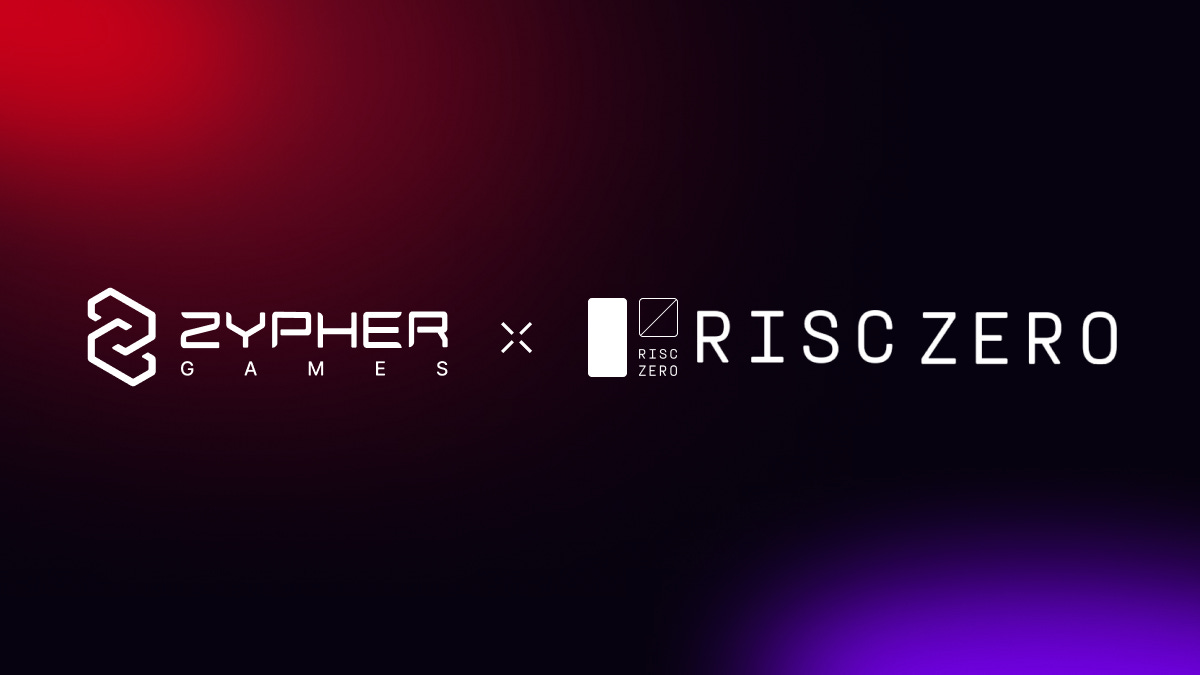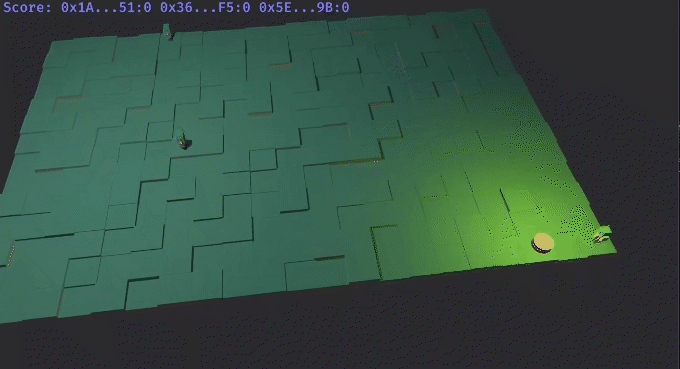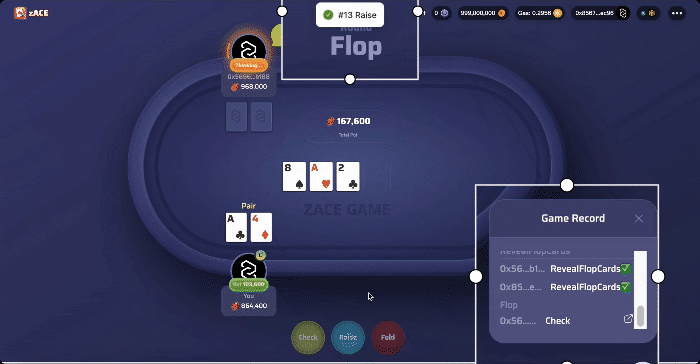Partnering with Risc Zero: a New Paradigm for Verifiable On-chain Games with zkVM
We are delighted to extend the Risc Zero ecosystem with AI & ZKP-powered “Public goods” for chain-agnostic Autonomous Worlds.
We’re thrilled to announce a Strategic Partnership with Risc Zero for resilient and economical provable on-chain games. We are integrating Risc Zero’s general purpose zkVM (later Bonsai proof market) in our game engines and extending the functionality with enshrined game-dedicated SDKs, expanding Risc Zero’s use cases to support Autonomous Worlds with authenticity, integrity, validity.
The Ambition for Open-ended Autonomous Worlds.
At Zypher Games, our focus lies in delivering the infrastructure for decentralized games proficient enough to serve 3 billion players worldwide.
By replacing the trust in game studios/publishers with trustless state machines, we are building a new paradigm of open-ended, decentralized games, composable & interoperable at the state & logic layers, laying the foundation for permissionless modding, open economy, and infinite endurance.
However, integrating “core gameplay” on-chain presents several dilemmas. Let’s use the much-anticipated card game as an example:
A transparent ledger fails to meet the need for “hidden” information to selectively reveal the card only to the card holder.
Players need to wait for state transitions (gamer’s moves) to be synced with other games' clients.
Existing dApp infrastructures, mostly based on EVMs, are not designed for high-responsiveness, frequent state-transition use cases, failing to afford the required cost-efficiency, scalability, and secret primitives. Consequently, most on-chain games are architected as Web 2.5 games, with on-chain asset layers ensuring asset interoperability & trustworthiness, while the “core gameplay leading to asset generation” remains centralized.
Transforming On-chain Gaming Development
Zypher has developed several Solidity/Rust/WASM-based ZKP-powered solutions to address these issues, offloading resource-intensive computations off-chain and verifying game results on-chain.
Secret Engine provides a suite of SDKs for in-game imperfect information, e.g. shuffling SDK, matchmaking SDK to address on-chain randomness & information asymmetry needs.
AW Engine provides high throughput via vertical scaling; it also supports on-demand zk-powered microchains for real-time multiplayer gameplay.
Zytron Kit is a customizable layer 3 rollup stack supporting both engines as precompiled contracts; as well as other plug-n-play modules including optimized P2P layer/data compatibility module/server sharding etc.
Zytron’s first alpha net, featuring 0 gas, 0.2s block time, game-dedicated pre-compiled contracts is coming in 2 weeks, with a few games as pioneer testers for our gamer’s community. More details will be shared soon.
Top: Real time, PVP In-house Demo powered by Zypher AW Engine & Bevy Engine, with 100x-ed throughput level.
Bottom: The first ever fully on-chain, AI generated TCG (trading card game) powered by Zypher Secret Engine’s zk-shuffle & zk-matchmaking SDK.
Risc Zero zkVM: Verifiable Computations, Verifiable Games
Ethereum was not originally designed around ZK-friendliness, so there are many parts of the Ethereum protocol that take a large amount of computation to ZK-prove.
Vitalik, “different types of ZK EVMs”
Risc Zero features a general-purpose, verifiable zk virtual machine, a game-changer for resilient, economic computing infrastructure. By executing logic in the zkVM, the code’s output is faithfully generated & never manipulated. This provides trustless authentication and validation, laying the foundation for open-ended, DAO-governed, self-sustained gameplay.
During the games, by executing the logic in the zkVM, the code’s output is guaranteed faithfully generated & never manipulated. This has provided a way to trustlessly authenticate and validate that the user has performed certain tasks, e.g. upgrade a garrison building, complete a campaign, etc. without registering each single event as a transaction. What’s more, any gamer in the community can pair a game’s output with a self-certifying receipt, proving that the game results are unaltered and verifiably fair, laying the foundation for open-ended, DAO-governed, self sustained gameplay.
Later we’ll also integrate with Bonsai, Risc Zero’s proving service, for efficient, parallel proof generation in games; this would be especially useful for players on less performant devices like mobile, greatly reducing the hustle in the game process and further democratizing Autonomous Worlds to be device agnostic.
Integrating with Bonsai will help us avoid proof generation related complaints from users.
From Zero to One, Towards Public Goods
Last week, we wrapped up a testing session with engineers from the Risc Zero team, on a fully on-chain card game built with our shuffle SDK powered by Risc Zero zkVM. The game displays the process of shuffling, cutting cards, revealing the card, etc. with an acceptable response time. The most important thing is, the game is fun. Risc Zero’s team has mentioned a soon-to-release version with support for large integers, which can greatly enhance the SDK’s performance to the next level.
Risc Zero’s ZK VM is already alleviating the burden for general developers to write zk games in a preferred language, without the need to deal with complicated cryptography related circuits using low-level languages. We are now further pushing this forward for mass adoption with more developer tools.
We’re now working on a series of open-sourced, one-stop SDK services for game developers powered by Risc Rero. With enshrined services like shuffle SDKs, on-demand rollup SDKs, Web2 developers can directly use the toolkit to build on-chain games that are interoperable on the logic level while not making fundamental changes to existing software development cycles. We envision this as a set of “public goods” to drive adoptions of ZK from a relatively “niche” narrative to more widely used by millions of users in the web3 space.
This partnership is an exciting step forwards into the future of on chain gaming. It lays the foundations for a new generation of games no longer limited by gas fees and EVM. And demonstrates how world class teams like Zypher Games can build innovative and performant ZK based applications using the RISC Zero zkVM.
Steven Li, Growth at Risc Zero
As we embark on this strategic partnership with Risc Zero, we're thrilled to pioneer the next evolution of on-chain gaming. Their pioneering efforts in developing the Risc Zero zkVM & Bonsai Market have revolutionized the way we approach on-chain computations, paving the way for more efficient, scalable, and secure games. We believe that together, we can create groundbreaking solutions that will benefit users worldwide.
Neo Sun, CTO at Zypher Games
About Zypher Games
Zypher Games is building the next-generation infrastructure for Autonomous Worlds, featuring a suite of ZKP-powered game engines from Sovereign Layer 3 Rollups to ZK-as-a-service SDKs. Our technology provides decentralized games with the required composability, programmability, scalability, and cryptographic primitives. It empowers game developers to craft rich, interactive worlds, emphasizing scalability, fairness, and the intricacies of game strategy.










